Have you noticed how your cat responds to everything that moves? Whether it’s their favorite pet toy or a bird, they’re immediately after it. Your cute kitty is a fierce predator ready at any moment to catch a potential prey. Many cats like to chase and play with ants. This is why you may ask yourself ‘Do cats eat ants?’ And why do they do it?
Why do cats eat ants?
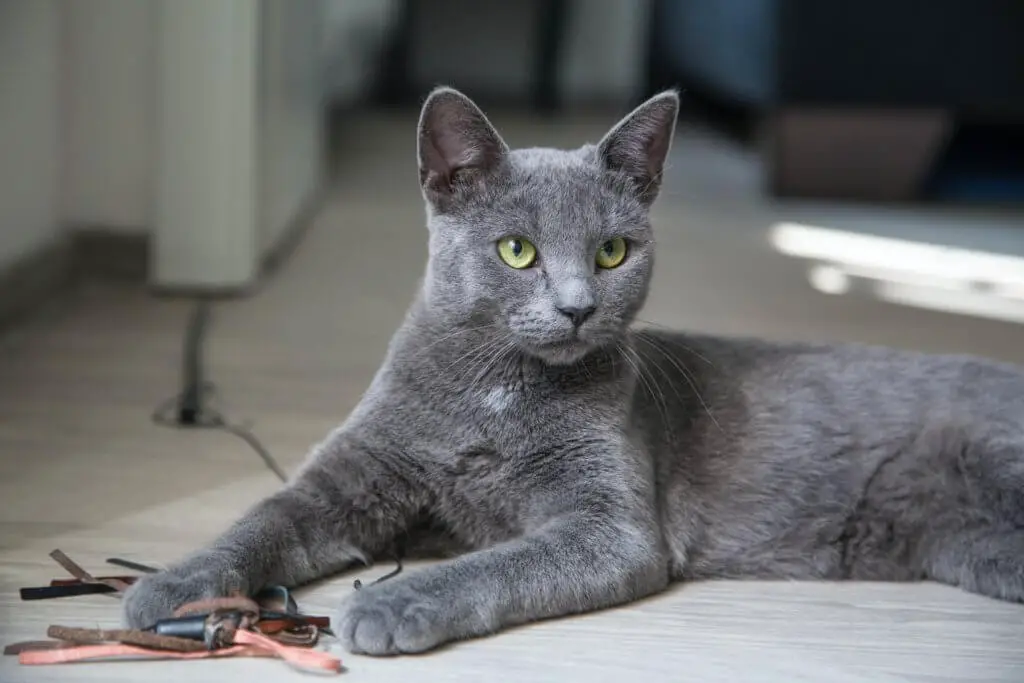
Ants represent a source of nutrients to cats. [2]
Even us humans eat insects in some parts of the world, so why would animals not do it too?
Ants contain various chemicals, such as alpha-linolenic acid which is known to soften a cat’s coat. This fatty acid found in various plants and oils is also added to cat food. Other animals process this chemical even more efficiently than cats.
Ants also contain other nutritive substances such as:
- Protein
- Zinc
- Iron
- Calcium
- Protein (they are consumed in some countries around the world as a source of protein)
- Low amounts of fat and carbohydrates
- Formic acid
More than using them as a food source, cats are attracted to ants.
The oleic acid they contain is also a component of cat pheromones.[3]
Have you ever seen your cat rubbing on furniture or other objects? They do it to deposit their pheromones on those surfaces. The oleic acid has a calming effect on cats and they will continue to rub to relax themselves.
It all begins with the cat’s instinctive response to motion. But after hunting down the insect things become even more interesting.
Why do cats eat ants?
Because the highest amounts of pheromones are emitted by ants when they are crushed. So when the powerful smell of pheromones is released by dead ants, your feline experiences a pleasant sensation.
Is it okay for cats to eat ants?
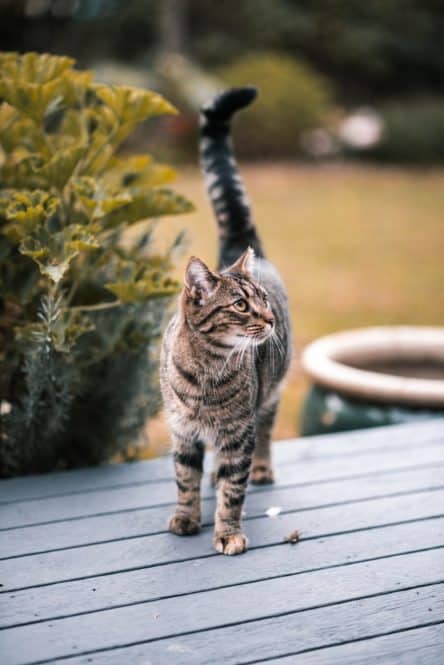
Generally it is okay for cats to eat ants, with two exceptions:
- Ants have been poisoned
- Those particular ants are fire or red ants
Other than that, eating ants is a very pleasant and healthy habit for your cat. This provides it with nutritive and calming substances and it enables it to follow its natural predator instinct.
There is no reason to prevent your cat from hunting ants if they are not poisoned. Even if your pet needs cat food for sensitive stomach, ants are not harmful. As for ants from dangerous species, read the following point to find out more about them.
What kinds of ants are dangerous to cats?
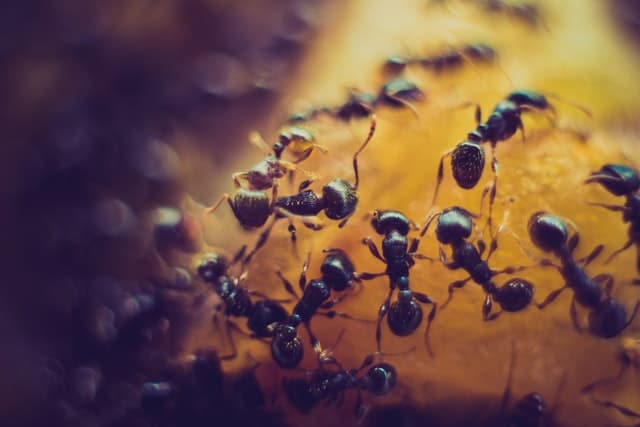
Have you seen your cat toying with a red ant? It is not a good idea.
These ants tend to fight back when they feel threatened. They come back in large numbers and attack the person or animal bothering them.
Being bitten by a red ant is not pleasant. These insects inject a toxic alkaloid in their unfortunate victims. The result is a stinging sensation, followed by swelling and possibly an allergic reaction. [4]
The worst thing that can happen is your cat having a severe allergic reaction. If dozens of red ants bit your cat, the consequences can be terrible. Multiple bites can even lead to death.
If the cat manages to get the ant in its mouth, the insect can still bite as long as it is alive. Swelling can occur in the cat’s throat or windpipe, causing it to suffocate. This can happen without warning and you may have no clue of what is bothering your pet.
So, is it okay for cats to eat ants? Not if they are red ants.
Other insects that are dangerous to cats
Chasing ants with much pleasure means that your kitty will also take an interest in other insects. Cats use their excellent hearing and vision senses to immediately detect motion. But some bugs should be avoided by your furry friend:
- Poisonous spiders
Small house spiders are inoffensive. However, poisonous spiders that are harmful to people will also represent a problem to pets. Venom from spider bites can be very dangerous to small pets like your cat. The damage from one spider bite is higher for cats than it is to larger animals or humans. Make sure you avoid the black widow spider and the brown recluse.
- Bees and wasps
We know that the sting of a bee or wasp is very painful. There is also the danger of a potential allergic reaction and anaphylaxis, both in humans and animals.
- Some caterpillars
Common caterpillars do not represent a threat to cats, but some exotic species can sting or be poisonous when ingested.
- Scorpions
Needless to say, scorpion stings are very painful and dangerous. Beware of these crawlers if you reside in Arizona.
- Roaches
Ingesting roaches is dangerous because the exoskeletons can cause digestive issues. They can also carry various parasites that are harmful to cats.
- Fleas and ticks
Use flea control products to prevent problems such as itchiness, anemia, and worms. Ingesting these parasites is also a health risks because they can cause tapeworm infection. Ticks transmit disease, so if you see them on your cat, take it to the vet for removal.
What if your cat eats red ants or another dangerous insect?
If you suspect your cat has eaten a dangerous insect or has been bitten by one, call your vet immediately. The best is to have a reliable vet who knows your cat’s health history.
Worried that your cat has ingested a harmful insect? Look for symptoms such as:
- Vomiting;
- Gastrointestinal issues;
- Pain;
- Drooling;
- Wounds;
- Paralysis;
- Muscle tremors;
- Lethargy;
- Trouble breathing;
- Seizures;
- Unusual behavior.
Can ant poison kill cats?
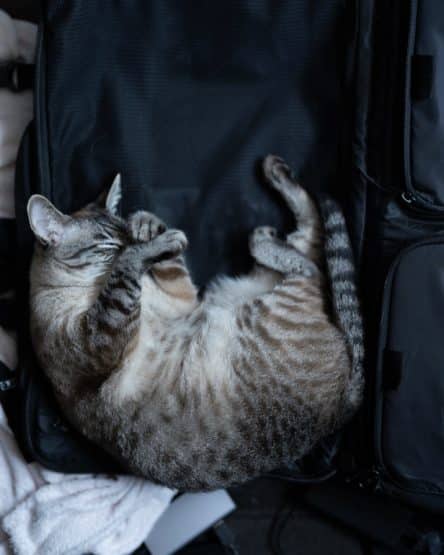
The other situation when ants can be dangerous to cats is the insects being poisoned. But how much poison can be in one ant? And can ant poison kill cats?
The general impression is that cats are less easily poisoned than dogs because they are fussy eaters. On the other hand, they tend to hunt more and will groom their fur. Such behaviors can put them at a higher risk of getting poisoned.
A few ants that have come in contact with poison may not cause harm. However, ingesting the actual poison is a different story.
Since cats are small pets, the amount of ant poison that can harm or kill them can be lower than you expect.
If you use insecticide sprays to get rid of ants, you should know they are not without danger.
EPA (The Environmental Protection Agency) suggests installing low toxicity stations that are not harmful to pets. Products such as Combat are specially created to target ants and have lower toxicity in house pets. Make sure the stations are not easily accessible to pets. Never put them near the pet’s toys or food and water bowls.
Are ant traps poisonous to cats? Is ant bait safe for cats?
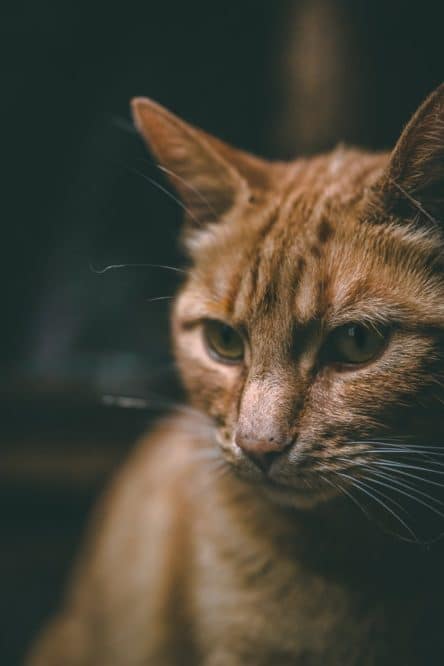
If you find ants in your home, you will naturally want to get rid of them. The first thought is using ant poison. This can be a problem, though, if you have pets or young children. [5]
While looking for a solution, you will probably be researching this on the Internet. Are ant traps poisonous to cats? Is ant bait safe for cats?
Even if ant bait is less toxic than insecticide sprays, you do not want your cat to eat it. Ant baits contain boric acid, which is considered by the EPA as ‘moderately acutely toxic’.
Boric acid can harm your cat if ingested or through direct skin contact. The cat can ingest the substance when cleaning themselves.
It would take a large amount of boric acid to cause serious illness in an adult healthy cat. More serious effects can appear in kittens, elderly cats, and cats suffering from chronic illness.
Symptoms of acid boric poisoning in cats include:
- Vomiting
- Diarrhea
- Weakness
- Loss of appetite
- Seizures
- Skin irritation
- Redness and swelling
- Burning sensation
Some bait may contain arsenic, which is more dangerous than boric acid. In high doses it will cause death, while chronic exposure will decrease appetite and cause nerve damage.
So ant bait and ant traps can kill your cat, depending on the type and amount of toxic substances they contain.
What to do if your cat eats ant poison
What happens if cats eat ant poison? If you notice one or more symptoms presented earlier, call your vet immediately.
Keep the Pet Poison Helpline phone number 800-213-6680 ready to hand. You can find out valuable information and advice in the crucial minutes or hours before you get to the vet.
How to get rid of ants around cat food?
Now that you know you should use ant bait and poison cautiously, you may still have question. For instance, how to get rid of ants around cat food?
Ants are naturally attracted by food. Even a few crumbles of bread on the kitchen floor can attract these tiny annoying insects.
Your cat’s food bowl can become the main attraction for ants in your home. Here are some measures you can take:
- Keep cat food in airtight containers
Instead of keeping food in open bags, transfer it to an airtight plastic container after opening. This will also preserve the food’s flavor and properties for longer.
- Wash food bowls regularly
Wash food bowls at least every couple of days. Never leave crumbs and food leftovers around your cat’s bowls.
- Maintain the feeding area clean
Remove crumbs and leftovers after the cat finishes eating. Mop the floor with a solution containing vinegar or lemon zest to deter ants.
- Create boundaries around the cat’s food
Use safe substances that repel cats, such as chalk, cinnamon, ash, petroleum jelly, essential oils, vinegar, or lemon.
- Remove existent ants
Dump contaminated food immediately, close the garbage bag, and take it outside. This way, ants will not be able to crawl back into the cat’s food.
Conclusion
Can ant poison kill cats? Yes.
Is it okay for cats to eat ants? Yes, except for red ants and if they are not poisoned.
You will still want to get rid of ants around cat food, but make sure you use safe, natural methods for deterring these insects.[6]